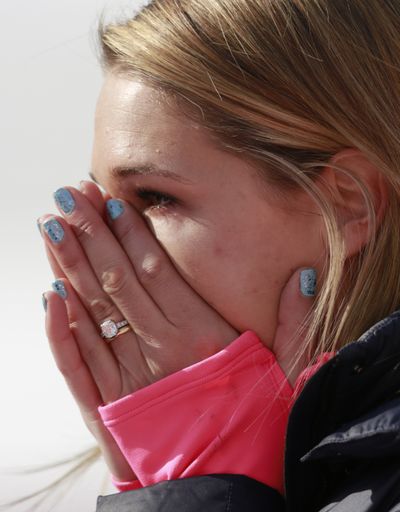U.S. skiers back on podium
Weibrecht, Miller win silver, bronze

SOCHI, Russia – Bode Miller cried at the finish line Sunday.
America’s most decorated alpine skier provided an emotional moment after winning a bronze medal in the super-G to change the fortunes of the down-in-the-dumps U.S. ski team.
“It all came out,” Miller, 36, said.
American skiers roared back to life Sunday as Andrew Weibrecht of Lake Placid, N.Y., won the silver medal and Miller tied for the bronze at the Rosa Khutor Alpine Center in Krasnaya Polyana.
Before Sunday, the Americans had earned one medal halfway through the alpine skiing segment of the Sochi Games with Julia Mancuso’s third-place finish in the super combined.
But Sunday’s results should give the team a lift as it heads into the slalom events with some of the world’s best technical skiers.
Weibrecht finished with a time of 1 minute 18.44 seconds, .30 behind winner Kjetil Jansrud, who helped extend Norway’s streak to four consecutive Olympic super-G victories.
Miller shared the bronze with Jan Hudec, who got Canada’s first alpine medal in 20 years.
Four years ago in Vancouver, Miller won the silver and Weibrecht the bronze in the super-G, a hybrid between the downhill and the giant slalom.
Ted Ligety of Park City, Utah, was 14th while Squaw Valley, Calif.’s Travis Ganong was 23rd as all the Americans made it to the finish line.
Miller hugged wife Morgan Beck after earning his sixth medal in five Olympics. All the while he thought about how he got there.
After a serious knee injury in 2012, the New Englander considered retiring, feeling he had accomplished so much already it would be OK to walk away.
But the knee responded to therapy and Miller clawed his way to Sochi.
“I wanted to come in here and race the way I would be proud of,” he said.
That didn’t happen in the downhill and super combined last week as the Americans got shut out after winning eight alpine medals in Vancouver.
Although Miller, 36, finished in the top 10 both times, he was bitterly frustrated with the effort. The skier who now lives in San Diego might have celebrated the results, considering the road it took to get to the finish line.
Besides the knee injury, Miller dealt with a high-profile custody battle and grieved over the death of brother Chelone Miller, who last year suffered a fatal seizure.
Chelone Miller, 29, had hoped to make the Olympic snowboard team.
“I thought he’d have a good chance of making it,” Miller said. “It connected with my journey of coming back.”
On Sunday, Miller became the oldest alpine skier to win an Olympic medal, and the first American skier to medal in three different games.
Miller also moved to No. 2 with speedskater Bonnie Blair on the all-time U.S. Winter Olympic medal list. Only Apolo Ohno, with eight, has more.
“Under the circumstances, it is a miracle that I skied the way I did,” he said.
Weibrecht, 28, also measured his medal in terms of the miraculous. A virtual unknown to most Americans, the New Yorker is proving to be a big-stage skier like Mancuso.
Ligety described Weibrecht as the fastest skier in the world for the first 20 seconds of any race. Sunday, he was fast all the way down the slope.
Like Miller, it wasn’t easy for Weibrecht to qualify for Sochi. He underwent two shoulder surgeries and two ankle surgeries since the Vancouver Games.
The silver medal also was impressive because Weibrecht drew a late start with bib 29. Early starters usually have an advantage with better course conditions.
“I made a resolution I wasn’t going to let it affect my performance,” he said.
When he crossed the line, Weibrecht didn’t see the scoreboard to know that he had likely finished second.
But Weibrecht knew he had skied fast, faster than almost any time in four years. So, the medal almost didn’t matter.
Almost.